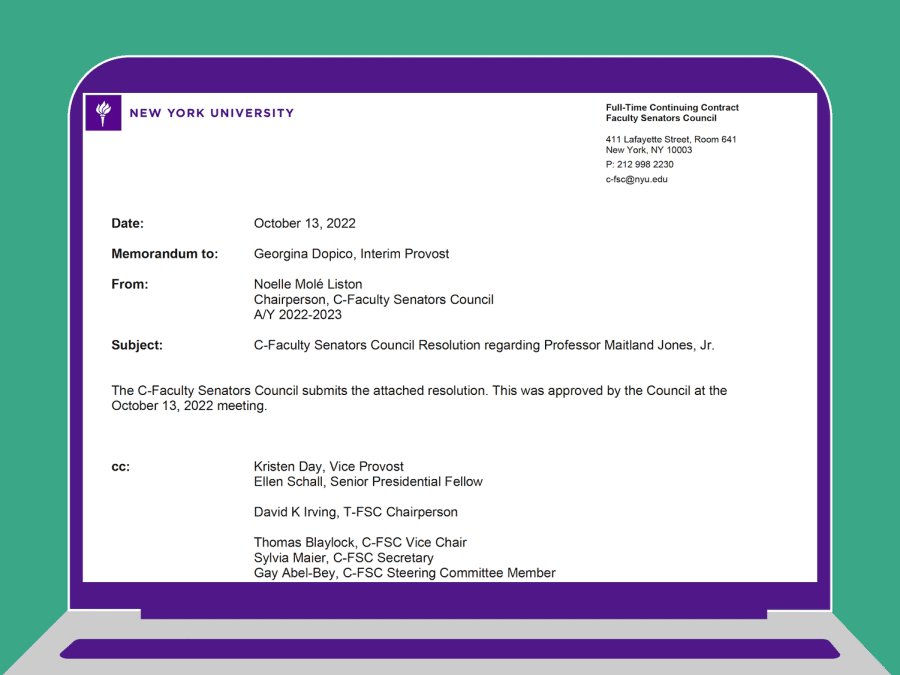Faculty demand investigation into Maitland Jones Jr. firing
A council of contract faculty is asking NYU administrators to reopen the case of the former organic chemistry professor’s termination.
In a meeting on Oct. 13. The Full-Time Continuing Contract Faculty Senators Council has demanded the university open an investigation. (Courtesy of Full-Time Continuing Contract Faculty Senators Council, Illustration by Susan Behrends Valenzuela)
October 21, 2022
Several NYU faculty members have called on the university to open an investigation into the firing of former organic chemistry professor Maitland Jones Jr. after his case made international headlines earlier this month. They have also requested a statement from the university explaining why Jones was not given the right to file a formal complaint about the circumstances surrounding his termination.
The faculty members are part of the Full-Time Continuing Contract Faculty Senators Council, which passed a resolution outlining its demands in a 26-0 vote with one abstention during a meeting on Thursday, Oct. 13. The council is comprised of 30 faculty members who handle administrative and academic policy.
Jones told WSN that he supports the resolution.
“The Jones case raises many significant issues: student-driven faculty dismissal, demands for grade inflation, the value of organic chemistry in undergraduate pre-health education, and the precarity of contract faculty,” Noelle Molé Liston, the chair of the senators council, said. “In recognizing their right to grieve for all full-time faculty, the university would promote the equity of who can be heard and seen.”
Jones was a chemistry professor at NYU before his contract was terminated by administrators this summer. A New York Times story about his employment prompted debates about whether “weed-out” courses should exist and the sensitivity of Gen Z. For NYU faculty members, however, Jones’ case resurfaced concerns about long-fought-for employment rights at the university.
[Read more: Documents reveal aftermath of Maitland Jones firing]
Since the university designated Jones as “other faculty” — a category distinct from adjunct, contract and tenured professors — administration determined that he was not allowed to contest his termination. This decision ignited fear among contract faculty, whose union is not formally recognized by the university.
The council also passed a second resolution during the meeting, which recommended that the university revise the faculty handbook to better protect employees from sudden termination. This resolution also passed unanimously with one abstention.
The resolution details that the right to grieve for all full-time faculty was enshrined in the university’s faculty handbook between 1973 and 2015. The resolution also explains that contract faculty are concerned that their contracts could be terminated, similar to Jones, if the university decides to designate them as “other faculty.”
“Pending the Handbook’s revision, the NYU administration should adhere to the traditional spirit of the Handbook, which was never to deny a right to grieve to any full time faculty member, whether classed as ‘Other Faculty’ or not,” the second resolution reads.
NYU spokesperson John Beckman told WSN that the university is reviewing the two resolutions and will respond promptly.
Beckman did not answer specific questions regarding how the university will ensure that contract faculty feel secure about their employment rights at NYU. He also did not answer several questions about the reasoning behind Jones’ designation as “other faculty.”
Heidi White, who sits on the senators council and is the chair of the council’s grievance committee, said that Jones’ firing has “sent a chill” through much of the university’s contract faculty. She added that she and many other faculty will feel relieved if the university opened an investigation into his termination.
“The unanimous vote, with one abstention, for an investigation into the case of Professor Jones shows that we believe the university needs to put its house in order,” White said. “This whole affair seems to be what they call a crying abuse. When something goes wrong, the way a university fixes such things is to investigate the case in question openly and properly, and then ensure that justice is done.”
Contact Abby Wilson at [email protected].

























































































































































